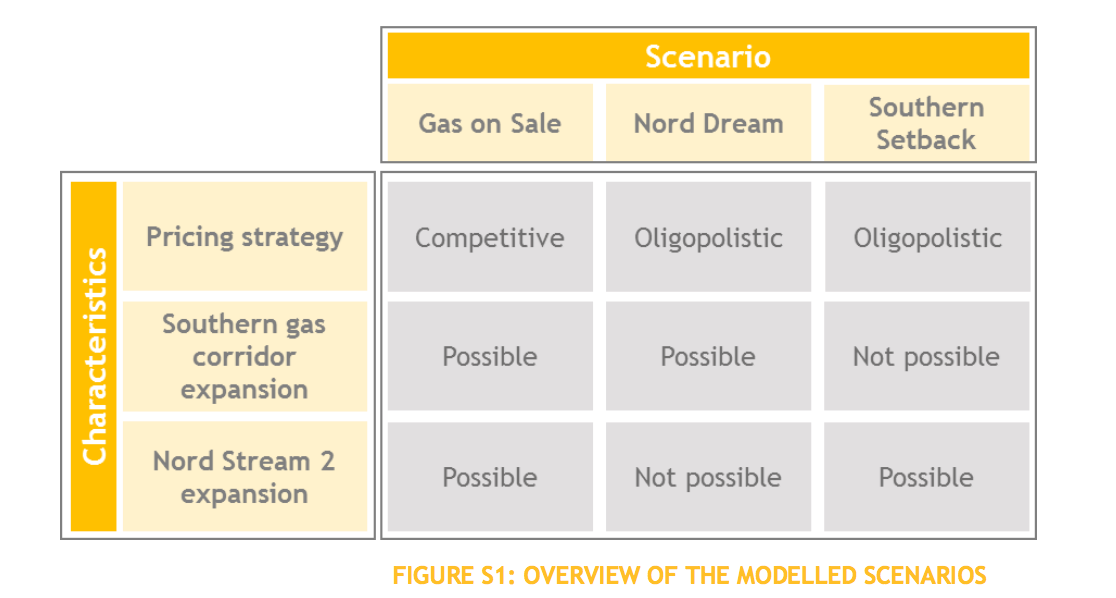GGP: Final Report - Options for Gas Supply Diversification for the EU and Germany in the next Two Decades
The statements, opinions and data contained in the content published in Global Gas Perspectives are solely those of the individual authors and contributors and not of the publisher and the editor(s) of Natural Gas World.
Natural Gas World welcomes ewi Energy Research & Scenarios, our newest Knowledge Partner.
Originally Published by ewi Energy Research & Scenarios and EUCERS in October 2016.
EXECUTIVE SUMMARY
The study assesses future options for gas supply diversification of the EU and Germany until 2035. It provides comprehensive research on the economic and political fundamentals that are likely to shape Europe’s gas future. These fundamentals allow developing several potential scenarios, which could shed light on the key directions European supply may take in the next two decades.
Based on a set of assumptions, the study presents three scenarios: “Gas on Sale” (GoS) which is the reference scenario, “Nord Dream” (NoD), and “Southern Setback” (SoS). The scenarios are distinguished by two principal factors. One factor is the pricing strategy adopted by Gazprom and its competitors in Europe. The pricing strategy could be “competitive”, whereby dominant gas suppliers compete for market share via undercutting their price, or “oligopolistic”, where the principal priority is ensuring higher prices for natural gas rather than maintaining a market share. In case of a competitive pricing strategy, competition keeps prices relatively lower — hence the “Gas on Sale” title for the scenario. Due to the current market developments in the global but also the European gas market the competitive pricing scenario will be the reference scenario of the study at hand.
The second factor is the sum outcome of political factors that have proven to be consequential for natural gas supplies in the past, and are likely to remain so in the future. Accordingly political developments, both domestic and external, determine how two major supply options for Europe materialise. These two options are the construction of the Nord Stream 2 and the expansion of the Southern Gas Corridor. Accordingly, the “Nord Dream” scenario reflects the failure to build the Nord Stream 2 pipeline, whereas the “Southern Setback” is characterised by a range of political developments that obstruct the further expansion of the Southern Gas Corridor.

FIGURE S1: OVERVIEW OF THE MODELLED SCENARIOS
As illustrated in Figure S1, the Gas on Sale Scenario assumes competitive pricing by Gazprom and its main competitors, along with a political context that does not prevent the realisation of the Nord Stream 2 pipeline project and the expansion of the Southern Gas Corridor. The “Nord Dream” Scenario is based on the assumption of oligopolistic pricing by suppliers coupled with a political context that obstructs the development of the Nord Stream 2 project. In the “Southern Setback” Scenario, the major variable influencing the political context is the EU’s hope and ability to rely more on the Southern Gas Corridor as an alternative source to diversify its natural gas supplies.
The economic analysis is conducted by applying the global gas market model COLUMBUS, which is an economic equilibrium model of gas supply with the possibility to simulate oligopolistic and competitive strategies, as well as endogenous investment in gas infrastructure. The political analysis is founded on comprehensive research on the relevance of politics in energy policy decisions. Future projections on political developments are based on established scenario writing literature underlining a process of formulating scenario building blocks. The political scenarios are cognizant of a wide array of uncertainties, but also benefit from a range of constraints and predetermined elements that allow narrowing down future projections.
Originally Published by ewi Energy Research & Scenarios and EUCERS in October 2016.
The statements, opinions and data contained in the content published in Global Gas Perspectives are solely those of the individual authors and contributors and not of the publisher and the editor(s) of Natural Gas World.



